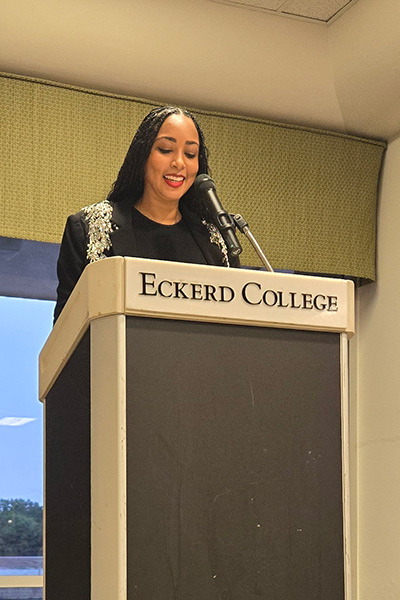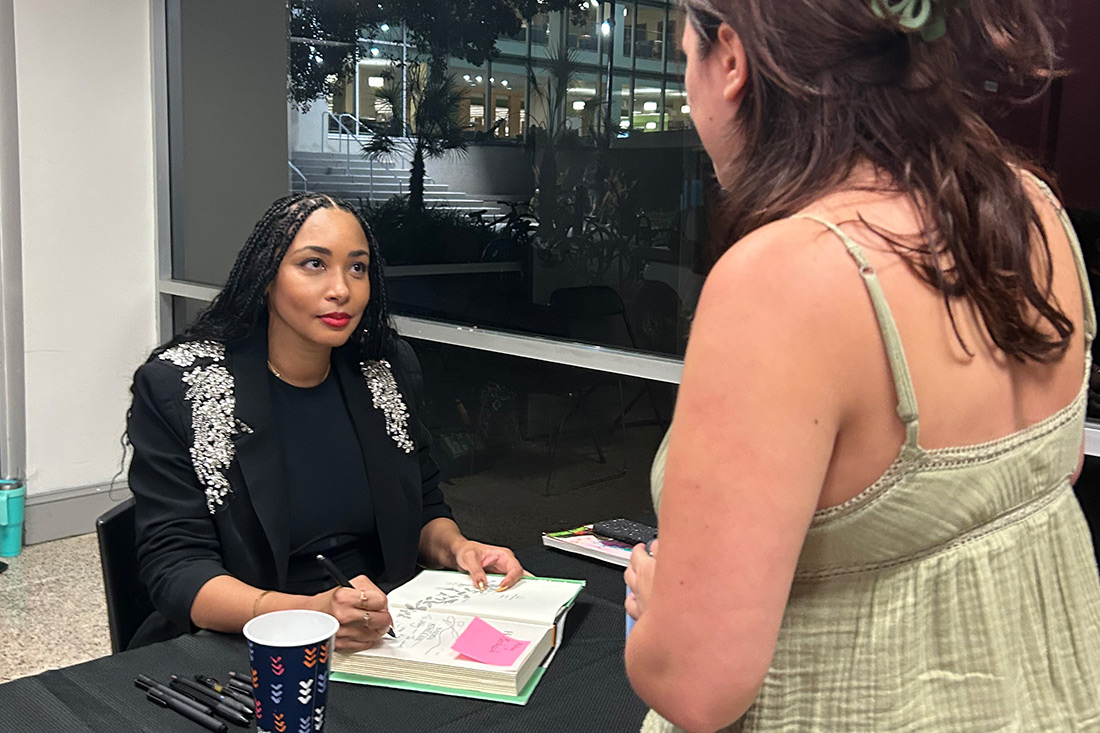Eckerd College had the unique opportunity to witness a poetic revolution when Safiya Sinclair, Ph.D., a renowned Jamaican poet and author, visited campus for a reading, discussion and book signing of her memoir, How to Say Babylon.
First-years and seniors were assigned Sinclair’s memoir as a part of the Summer Reading Series funded by Eckerd’s Class of 1968 Distinguished Visiting Scholar Endowment, but her live reading on Sept. 12 introduced the audience to an even deeper experience of her work.
Sinclair, with her lilting Jamaican accent, began the event by reading from her poetry collection, Cannibal. Her voice flowed—each word carefully chosen, each poem delivered with distinct tone, body language and emotion. She captivated the audience, guiding them through the complexities of language and history that form her identity as a Jamaican woman. Her work explores what it means to come from a people labeled as “savage,” tracing the linguistic history of colonization and its lasting effects.
One of the standout moments of the night was her reading of “Pocomania,” a poem rooted in Jamaican folk rituals, spirit and dance. The folklore came alive in her voice, creating vivid imagery for the audience, and the personal significance of the poem was clear as she tied it to growing up with her father.
Ameila Anderson, a senior environmental studies and economics student from Chelmsford, Massachusetts, says she felt inspired while reading How to Say Babylon in her Imagining Justice class and was excited to see Sinclair in person.
“It was beautiful. Everyone had been telling me that in her audiobook—because she narrates her audiobook—that when she speaks, it’s just different,” Ameila explains. “They were so right. When she speaks her poems, they are so beautiful and just some sort of magic you don’t get when you are just reading her work.”
Sinclair has often spoken about the deep influence her father has on her life and work. As a Rastafarian and a prominent figure in her upbringing, he instilled in her a sense of cultural pride and a connection to their Jamaican heritage. His presence in her poetry reflects the lasting impact he has, not only as a father but as a symbol of the struggles and resilience that shaped their family’s story. Through “Pocomania” and other pieces, his influence serves as a central part of her creative expression.
“It was really amazing,” Amelia says. “I keep feeling that she has gone through so much that she is allowed to be negative—and she’s not. She continues to be hopeful for the future. It’s so sweet and amazing to see that it hasn’t dragged her down. That it’s just pushed her forward. And it’s really inspiring.”
Next came “Mermaid,” which delves into Caribbean history, and “Portrait of Eve,” in which Sinclair shifted her tone, making the piece even more relatable to the audience. The dynamic use of voice kept the students engaged, demonstrating her ability to embody each poem with intention and care.
While studying for her master’s degree in Virginia, Sinclair continued to write, grappling with the Confederate history embedded in the region. She addressed this discomfort in her poem “Another White Christmas in Virginia,” where she confronted the remnants of that legacy.
In a surprise to the audience, she followed this with her unpublished poem “Double America,” a piece remarkable for its symmetry—it begins the same way forward as it ends, a reflection on the cyclical nature of identity and oppression.
One of the most unique moments of the evening came when she introduced her poem “Sofia the Robot Contemplates Beauty,” which brought an intriguing connection between artificial intelligence and human girlhood. Her imaginative exploration of divinity and femininity in the piece sparked deep contemplation among those listening.
The night reached its crescendo with “Planet Dread,” her most recent work. This poem weaves together her Rastafarian upbringing, the vernacular language of her family and the distinctiveness of Jamaican speech. Sinclair shared how her family’s daily interactions shaped her own voice and writing. The poem was a perfect closing note—an homage to her roots and the complexity of her identity. It left the audience in awe, culminating in a well-deserved standing ovation.
Sinclair’s visit to Eckerd was more than just a reading. It was an immersion into the heart of her world—where language, culture and history come together in a powerful symphony. Through her poems, Sinclair offered students not only a glimpse of Jamaican life but also a call to reflect on their own identities and histories that shape them.















